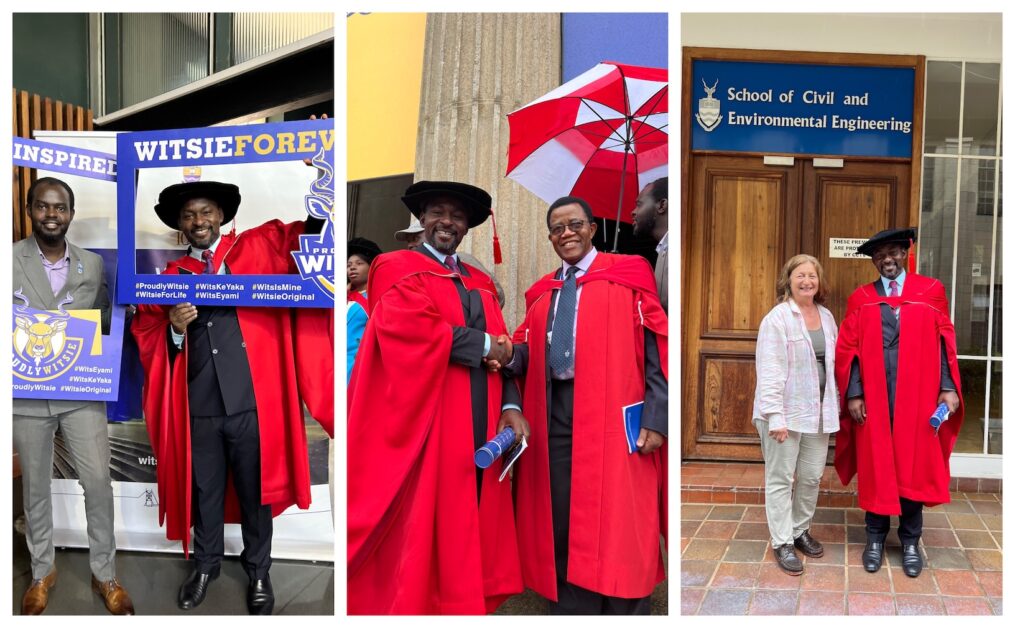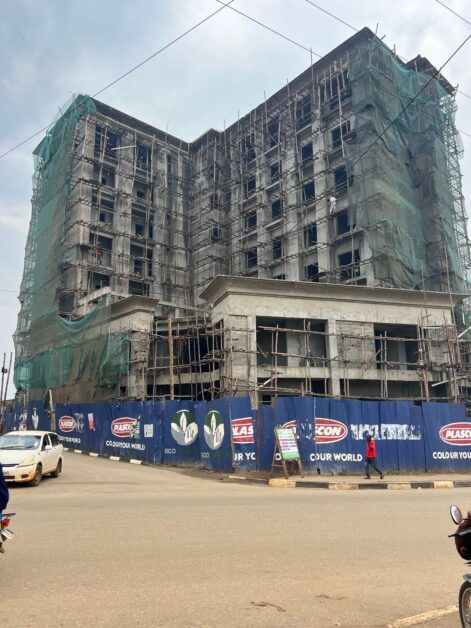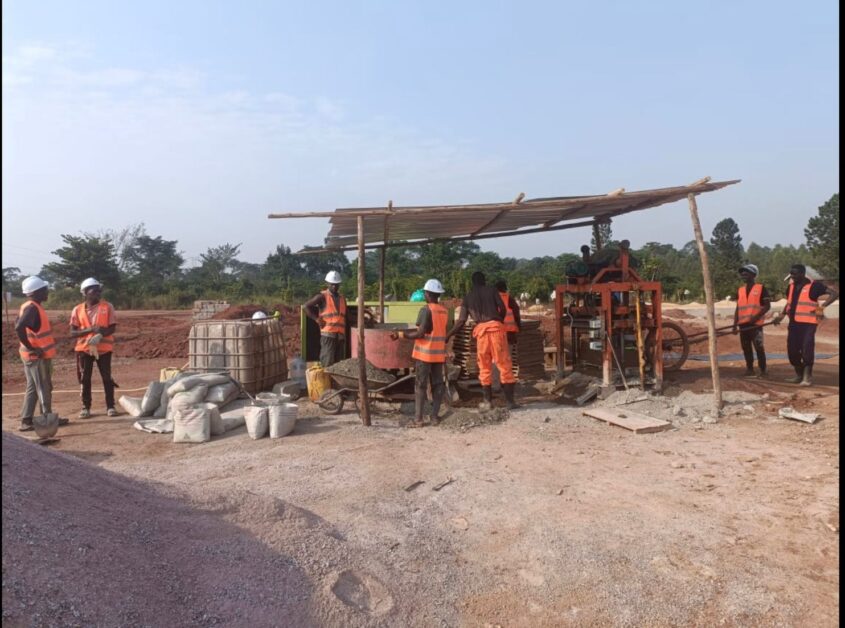Dr. Apollo Buregyeya is the Founder and CEO of Eco Concrete Ltd, a Ugandan registered civil engineering firm that is in the business of housing construction and production of cement-based in-situ and precast construction materials with an “objective to produce strong, durable, and affordable products while drawing less from the environment”.
He is also a Lecturer of Civil Engineering Materials, Construction Technology, and Civil Engineering Infrastructure Maintenance courses in the Department of Civil and Environmental Engineering of Makerere University, Kampala – Uganda.
Apollo studied at Wits University, Johannesburg, South Africa, where he obtained a Ph.D. in Civil Engineering Materials, and Makerere University, Kampala, for his Master of Science in Civil Engineering as well as Bachelor of Science in Civil Engineering degrees. He also attended Doctoral Schools on cement characterisation at the Swiss Federal Institute of Technology in Lausanne, Switzerland, and at Eindhoven University of Technology (TU/e), the Netherlands.
He has over 15 years of experience working on various projects as a concrete materials specialist, construction technologist and consultant, both in Uganda and Bangladesh. Because of his training background, he has developed a deep understanding of cement and concrete materials, process technologies and design aspects that are fundamental to understanding and designing solutions towards developing more sustainable infrastructure on the African continent.

Apollo advocates for the development and ownership of local knowledge, materials, technologies, and contract forms, and their integration into construction processes in Africa.
“It is through ownership of the four fundamentals (knowledge, materials, technologies, and contract forms) that we shall be able to develop infrastructure on the African continent that we can afford. Implementing alien (European/Chinese) standards, technologies, materials, and forms of contract can only limit the growth of local industries and commit us to being markets for foreign commodities and services,” he insists.
Giving an example of British cement, commonly known as Portland cement, Dr. Buregyeya says that a bag of cement in Europe costs 3 Euros and labour to consume it in construction is relatively about 100 Euros (over 30 times the cost of the cement).
“The same bag of cement (same quality 42.5MPa) costs 11 Euros in Uganda and 22 Euros in both the Democratic Republic of Congo (DRC) and Burundi. It takes, on average, half a Euro in labour to use one bag of cement to build a block wall in sub-Saharan Africa. Accordingly, it made sense for the Europeans to think of automation and industrial processes that eliminate as much labour as possible,” he explains.
“While European and American industrial technologies are structured along optimisation of labour, our industrial technologies should be structured along optimisation of materials, the most expensive component of building. Blind adoption of foreign technologies, materials, and standards, without considering the motivation for their development, is therefore against all prospects of achieving affordable housing/construction in sub-Saharan Africa. We can’t afford to be wasteful of material inputs in Africa,” he further reasons.

“We can’t be following foreign industrial standards and hope to recover from the trailing trajectory that has characterised our industrialisation progress for a century and beyond. Indeed, there is a serious struggle to meet the minimum quality standards against European rating in all sectors of industry in the limits of sub-Saharan Africa,” he adds.
Reducing the cost of construction in Africa by removing ambiguities and the journey towards green cement
Eco Concrete Ltd, his company, through its JengaBIM.com ICT platform, implements an alternative form of procurement (a different form of contract) that decouples materials requirements from the labour, technology, and administration requirements so that the ambiguity that characterises construction procurement is reduced. By implementing jengaBIM.com approaches, construction costs have been reduced by over 40%.
The Center for Affordable Housing Finance in Africa, in its 2020 report on housing and rental activity in Uganda, reports that 43% of construction costs is what accounts for direct materials and labour, 57% is partly lost to double taxation, poor infrastructure and developer overheads (http://housingfinanceafrica.org/app/uploads/UGANDA-FINAL-formatted-version-V3-13102020.pdf).
“So, innovation is more towards the process costs and that’s what motivates the work philosophy of Eco Concrete Ltd,” he reiterates.
Under his leadership, Eco Concrete Ltd, in a joint venture partnership with Concreet Projectmanagement B.V of the Netherlands, secured a grant in October 2020, from the European Union’s Horizon 2020 research and innovation programme (grant agreement no. 822273), to facilitate the development of a green cement (geopolymer cement) for industrial application in the East African market. The geopolymer cement was successfully developed from a composite of clay and volcanic materials sourced from Western Uganda as precursors and an alkaline solution (sodium hydroxide/caustic soda – a common salt with a lot of local industrial applications) as an activator for the polymerization reactions.
“The key benefit of the green cement project is that we don’t have to use the expensive and overtaxed limestone-based cements. For every 100 kilograms of limestone used in the cement production process, 56kg remains as cement and 44kg is lost to the atmosphere as carbon dioxide gas. To put it in simple terms, for a bag of 50kg of cement, if you also consider other processes associated with the delivery of cement within the limits of the Sub-Saharan infrastructure, you have 50kg of carbon dioxide gas released into the atmosphere. This is a lot of carbon dioxide, a greenhouse gas that contributes to global warming and climate change. The developed geopolymer cement reduces the carbon emissions by 80 -90%. Eco Concrete Ltd is working towards making cement a sustainable construction material,” Dr. Buregyeya reveals.

In 2021, Eco Concrete Ltd secured access to progressive financing from the Dutch Fund for Climate and Development (DFCD) through the World Wide Fund for Nature (WWF) to support piloting of the green cement in Uganda. The first phase of the DFCD funding supported studies on the financial feasibility and Environmental Risk Assessment of the green cement industry that is to be located in Rubanda District, South Western Uganda. This stage of green cement development has been completed and Eco Concrete Ltd is now developing detailed plans for prototyping of the green cement and production plant design development.
In 2017, Eco Concrete Ltd received a recognition award in the category of Innovation and Value Addition to Development Minerals from the UNDP and Uganda Chambers of Mines and Petroleum.
“The mission at Eco Concrete Ltd is to adapt and be sustainable as we care for our employees and give more value to our clients. For the people who work for us, we empower them with skills and life plans that enable them to be relevant to their communities. We are passionate about the youth group that has been isolated by formal education and we know that this resource lot is central to our transformation as a continent. It’s on this recognition that UNDP further supported Eco Concrete Ltd’s tofaliAfrica program and its objectives,” he adds.

TofaliAfrica (tofaliafrica.com) is a business model based on mobile manufacturing of construction materials. By deploying on a construction site a typical camp of 7 youths operating an industrial scale blocks and pavers making machine, “projects are able to reduce construction cost by about 20%, provide high-quality construction materials in the remotest places in Uganda, reduce the burden on the environment associated with concentrated extraction of raw materials, and provide democratic access to skills and jobs”.
“Through our business processes, we also meet youth mentorship objectives of skilling, empowering and restoring dignity. We provide skills to Ugandan youth in the production of construction materials, skills they can independently apply to lift themselves out of joblessness and poverty. For each block, planter and paver produced in our six camps, there is a story of a skill passed on to a Ugandan for the good of our country. At Eco Concrete Ltd., we believe that the opportunity to transform Africa lies in the majority of our youth who are incidentally isolated by the mainstream education system. Sustainability demands that we empower everyone,” he envisions.
